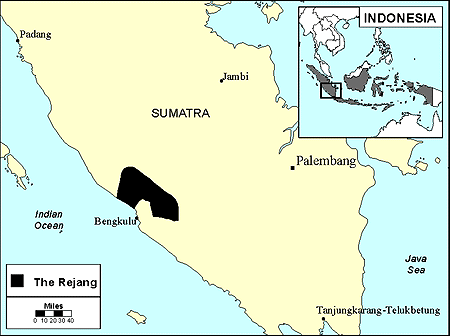|
|
Prayer Profile
The Rejang of Indonesia
![[IMAGE]](../images/0010.jpg) The Rejang live in the tropical rainforests along the Barisan Mountain peaks of Sumatra. This is the largest island of the Indonesian island chain. They are divided into five main regional groups: the Djang Lebon of the fertile upland region; the Djang Musai of the Musi Valley region; the Djang Lai of the Indian Ocean coastal region; and the Djang Bekulau and Djang Abeus, two mountain groups.
The Rejang live in the tropical rainforests along the Barisan Mountain peaks of Sumatra. This is the largest island of the Indonesian island chain. They are divided into five main regional groups: the Djang Lebon of the fertile upland region; the Djang Musai of the Musi Valley region; the Djang Lai of the Indian Ocean coastal region; and the Djang Bekulau and Djang Abeus, two mountain groups.
Rejang villages, called sadeuis, can vary in size from as few as 15 to as many as 900 households. Where irrigation is available, villages may even exceed 4,000 people. Each sadeui traces its line of descent with other villages in the sub-clan.
The Rejang have been isolated from the outside world for centuries. They hold a deep appreciation for their history and a keen dissatisfaction for anyone else's culture. These factors alone make them highly mistrustful and somewhat closed-minded to outsiders.
What are their lives like?
The tropical island of Sumatra has a hot, humid climate. Rice, tea, coffee, palm oil, ebony, ironwood, and rubber are all commodities produced there. The Rejang have a wide variety of occupations. Some work in food processing plants or as manufacturers of transport equipment. Others are skilled craftsmen, working with wood, metal, leather, and paper.
The traditional Rejang house has an open porch known as the "front room" for receiving guests. Intricately carved horizontal beams and ornamental, colored panels decorate the outsides of their homes.
The basic diet of the Rejang is rice, fruit, and vegetables. In their leisure time, they enjoy music and poetry. They also hold feasts and dances in the village social hall.
The social structure of the Rejang has been influenced in recent times by their Javanese neighbors. A "headman" is elected to lead each village community. Every village has a long hall, called an aleui, where ceremonial dances and feasts are held. Marriages determine whether a child belongs to his mother's or father's family or clan. Polygamy (having more than one wife at time) used to be common among the Rejang, but is no longer practiced.
Their language, Rejang-lebong, originated from an Indian language. It is very old, dating back to the time when Arabic characters were first introduced in Indonesia. It is closely related to another Indonesian language called Malay.
Both the men and women traditionally wear colorful skirts called sarongs or kains. A sarong is a long strip of cloth wrapped around the body; whereas, a kain is similar, but the ends are sewn together. Men wear shirts with trousers or sarongs. Women usually wear long-sleeved blouses with sarongs or kains.
What are their beliefs?
In previous times, the Rejang practiced animism. This is the belief that all natural objects, such as rocks and trees, as well as animals, have immortal souls. However, as a result of the islanders trading with Muslims, Islam edged its way into Sumatra by the end of the thirteenth century. Today, the Rejang have abandoned their animistic practices for Islam; however, they are less devout than their Muslim neighbors to the north.
What are their needs?
In 1952, British missionaries were allowed to move to Sumatra and work among the Rejang. Some fruit of their labors has apparently remained because small groups of Rejang Christians are now beginning to emerge. In fact, a small Christian church has been planted just north of where the Rejang live.
Sadly, there are still no scriptures in the Rejang language; neither are there any Christian radio or television broadcasts available. A few missions agencies have targeted the Rejang, but have experienced little success. Currently, there are only 128 known Rejang believers. Truly the harvest is plentiful but the laborers are few.
Prayer Points
- Ask the Lord to call people who are willing to go to Indonesia and share Christ with the Rejang.
- Ask God to strengthen, encourage, and protect the small number of Rejang Christians.
- Pray that the Rejang believers will be bold witnesses for Christ among their own people.
- Pray that God will raise up qualified linguists to translate the Bible into the Rejang language.
- Ask the Holy Spirit to soften the hearts of the Rejang towards Christians so that they will be receptive to the Gospel.
- Pray that God will open the hearts of Indonesia's governmental leaders to the Gospel.
- Ask the Lord to raise up a strong local church among the Rejang.

Statistics
Latest estimates from the World Evangelization Research Center.
THE PEOPLE
- People name: Rejang
- Country: Indonesia
- Their language: Rejang-lebang
- Population:
- Largest religion:
- Christians: <1%
- Church members: 128
- Scriptures in their own language: None
- Jesus Film in their own language: Available
- Christian broadcasts in their own language: None
- Mission agencies working among this people: 4
- Persons who have heard the Gospel: 307,900 (24%)
- Persons who have never heard the Gospel: 974,600 (76%)
THEIR COUNTRY
- Country: Indonesia
- Population:
- Major peoples in size order:
- Major religions:
- Number of denominations: 113
© Copyright 1997
Bethany World Prayer Center
This profile may be copied and distributed without obtaining permission
as long as it is not altered, bound, published
or used for profit purposes.
![[HOME BUTTON]](../graphics/home.jpg)
![[CALENDAR BUTTON]](../graphics/calico.jpg)
![[LIST BUTTON]](../graphics/listico.jpg)
[Home]
[Calendar]
[Country List]
|